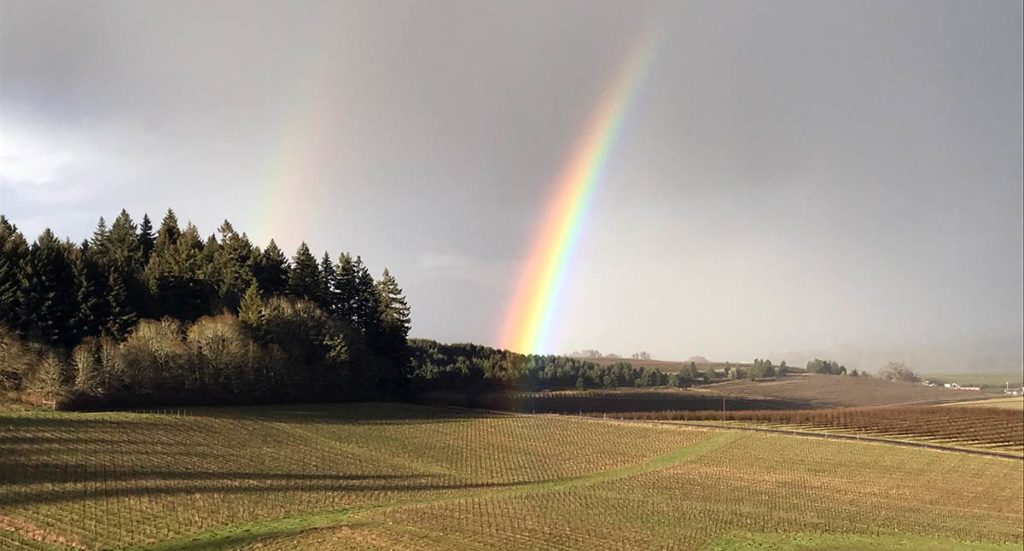
Catalyst:
an agent that provokes or speeds significant change or action
Most of you who follow Hope Well now know that 2020 was a catalyst. If you read Vendange 2020: the Hardest Lessons Yet, the events of 2020 were yet unfolding as I wrote that post, still eager to see what the harvest would yield, given the vole damage and the very low set. The fires had not even begun.
And then they did. Everywhere. In late August and early September, the Willamette Valley is not the verdant bucolic scene you might be picturing. Especially in recent years, it is perilously dry. The air becomes heavy with tons, literal tons, of topsoil from the plowing of recently harvested fields. It is shades of brown, shades of dry and brittle. Often there are distant fires burning that add to the insalubrious quality. Our weather can shift in this season, away from the predominant westerly marine influence, which cools our nights and adds humidity to our atmosphere; we can get bullied by easterly pressure systems coming off the Great Basin, bringing fierce, parched winds.
On September 7, I was getting organized for picking in the following weeks. I figured we had at least a week to ten days before the first grape client called a pick. It was windy, windy from the east. My eyes were gritty and I was feeling resentful and anxious about all the dust – all that soil in the air. And the animals were all acting bizarre, like they knew something I didn’t (they did). As the sun went down we were clearly in for something very different. The winds had grown very, very strong. We lost power early in the evening, and by full dark I was trying to soothe frenzied, terrified animals as we watched up to 20 dry lightning strikes a minute. It didn’t last any longer than an eternity, and that was enough.
The most beautiful dawn followed, the sky left crystal blue from the high winds, blowing our shame elsewhere. But then, as the sun crested the mountains in the east, walls of smoke were coming from every cardinal direction. I didn’t and couldn’t know that the fate of the Pinot Noir harvest was basically sealed, but as we sat for more than a week in enough smoke to set off the fire alarms in our home, and one after the other phone call came in from my winery clients telling me that they were not going to be taking their fruit, the weight of a crop unharvested sat on my heart and nearly crushed it.
But the thing about harvest is, it’s magic. And the greater the odds, the more calamitous it is, if I can get in the ring, I won’t stop until I’m unconscious. Harvest allows me to flip a switch and become this, like, much-better-than-usual-Mimi. My tumultuous mind becomes quiet and serene. I don’t need anything and I can give indefinitely. Regardless of the circumstances or the outcome, I am nourished by the communion of it all.
And so, when the smoke was finally dispelled by rain, with an entire crop on the vine, looking like nothing had happened, we went to work. I didn’t know where the grapes were going to go. I didn’t have the physical space for it. But every day we worked was out there. Every ray of sunlight, every photon, the very record of another year feeding what feeds us was still there, and we would honor the work. My crew counts on the harvest. It is a critical part of their home economies, it is the completion of our work, and a matter of pride.
And every fermenter I filled with Pinot noir smelled like a car fire. Not a campfire. Not woodsmoke. Plastic. Metal. If you follow wine I won’t need to tell you that Pinot noir, ever the formidable dance partner, is particularly susceptible to smoke taint. The volatile phenols of smoke compounds bind aggressively to Pinot’s notoriously thin skins. And so, I took everything we couldn’t save and fed it back to the land. For death is life’s one true covenant. To go on, life needs death, and the most honorable death is the one that feeds the next life. And we mourned, but we did not stop.
And there is always a reason to recall just how lucky you are in a moment like that. During the fires every day I came in from taking care of the animals or pacing the fields (alone – I would never ask anyone to work in those conditions) my family was there, alive, largely well, pandemic-weary and climate-anxious, but they were there and I could touch them. I am so very, very lucky.
There is a beautiful story I heard once about a poet who discovered, accidentally, where ecstatic joy comes from, and thereafter subjected himself to extreme deprivation just to find it again when he thought that he was getting too far from it. A silver lining can only be seen in a dark sky.
Which brings me to the white wines of 2020. For this is the way of the land. Perhaps it couldn’t have happened any other way. At any rate, I regret nothing, because we were richly rewarded. Losing the Pinot noir put a different focus on the whites, almost like saving the last seed, there was too much at stake and these wines have been so loved. They were the first and last wines I made in the Hobbit Hole that is no longer mine. And from harvest 2020 through 2021, they were the light that found a way in the dark, and shine with all the intensity that a perfect juxtaposition allows.
~ Mimi